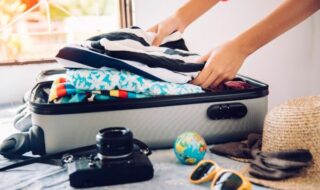
While a considerable effort is often being made for a smooth travel experience, such as hotel and flight booking, a list of attractions to visit, or things to do, the plan to keep homes left behind may not get that much attention.
When we travel, our homes can become a target for criminals, just like what was portrayed in the home of a family on a Paris Christmas trip in the 90s movie Home Alone. While Kevin McAllister being unintentionally left behind was the key to the prevention of burglary in the house, there is no Kevin’s equivalent to keeping thieves and criminals at bay in our homes.
Therefore every traveler on a family trip, honeymoon, or business trip must take certain steps to keep home safe and sound while enjoying the journey to a faraway place.
Make no mistake, criminals on home invasion are just one of the risks a home can be susceptible to. Other hazards include power surges, gas leaks, broken pipes, and more.
Basic measures which can be accomplished in just minutes can be a significant help to prevent unwanted incidents from taking place.
Table of Contents
Ask a trusted friend to occasionally keep an eye on your house.
If you know someone in the neighborhood more intimately such as a close family member, a friend since way back then, or a trusted member of the community, you may ask them for favors to get that desired peace of mind while you are away from home.
Depending on how you normally interact with each other, you can start with doing them favors or gifts (bribe, contribution, handout, whatever you call it) like bringing over freshly-baked cupcakes, volunteering for an activity they are organizing, or driving their kids to school. You can then ask if this “small” favor in return won’t be too much. If they nod in approval, you can hand over the keys so they can perform the following:
- Water your plants
- Feed your cat, fish, or any pets
- Walk your dog
- Gather your mail
- Rake the leaves or mow your lawn
This trusted neighbor should also have an idea of your trips such as travel itinerary, date of arrival, and contact information in case of urgent matters.
If you need an extra person to look after your home affairs (a separate dog walker perhaps), introduce them to each other to avoid mistaken identity and misreporting to the police.
Avoid tipping off criminals through posts on social media.
Travel provides an opportunity to share (or brag, depending on who you ask) travel adventures in faraway places. Once others take notice, those with bad intentions could hatch plans. A single social media post may be sent only to close connections but potentially reach hundreds or even a thousand others who are total strangers to you.
Although it’s not bad to share your photos, videos, and reflections during your holidays, be mindful of how others would respond to it. Ask yourself: would I be comfortable sharing my family’s week-long trip to Alaska on Facebook, Twitter, or Instagram while implying that there’s nobody home during such a period?

Be mindful of other messages you send across.
Choose wordings carefully when you write your out-of-office notifications (“I am embarking on the longest vacation with the family to 8 countries in Europe”) or even voice mail messages (“I will be away for a 3-week family vacation in Europe”). Such messages can give hints to others even though you may both know each other — colleagues, clients, or vendors who know your email — or those whom you don’t know such as delivery personnel.
While we are still on this topic, ensure that you are not expecting home deliveries such as e-commerce purchases from Amazon or another online shopping site. If you do, make a prior arrangement such as delegating the task to someone you know or arranging a pickup service from the warehouse.
Let authorities know your travel plans.
If there’s anyone who should know about your travel plans, it’s your neighborhood homeowners’ association or local police authorities. Although it’s not necessary to do so when you’re away for just the weekend, do inform them if you’re leaving town for a week or longer. By doing so, you might expect extra attention on your home when they’ll do beat patrols or routine checks.
Consider using programmed lighting.
One of the hints burglars see is that your home light is off at night. But baking it appears as though someone is in the house by leaving lights on throughout your vacation is not only going to inflate your energy bill but could look counterproductive as a such effort of consistently turning on the light deep in the night might look a bit suspicious. Again, this scene was evident in the Home Alone movie where thieves can easily predict at what time lamps at neighborhood homes light up.
Instead, consider purchasing electronic programmable timer switches which, on top of the conventional on/off switch, features daily “on” and “off” settings, along with a random setting that mixes up the times your lighting turns on and off while you are away, making it seem more probable to outside eyes that someone is home. Sample products include Honeywell Econoswitch or Enerlites Programmable Timer Switch. If you install outdoor lighting, consider units that trigger motion.
Remove your spare key
Once criminals have figured out you are away — from social media posts or tell-tale signs from outside your house like an overflowing mailbox or scattered leaves in your backyard — they could try to explore where spare keys are usually kept. This can be under the mat, door frame, flower pot, and other usual suspects.
Make no mistake of giving them the chance by removing that spare key away, leaving predators no chance of robbery attempt.
Tick these things off your list of ways to secure home while you are away.
If the above list is not enough, consider these things as well.
- Prevent fires at home. Fires can also take place during your vacation and mainly caused by power surges, gas leaks, faulty wiring, and other related hazards. Unplug your home appliances or use power surge protectors, and have authorized staff inspect your electrical system and gas connections. Not only you’ll save energy costs, but you’re also going to have peace of mind that your electrical appliances don’t run into risks of fires. Decide on whether to close or open curtains. You may easily decide to close your curtains to prevent people from peering inside your home to see whether you’re there. But closed curtains also stop those who aim to help from seeing inside your house like the police or neighbors.
- Leave curtains the way you usually do when you’re around. Otherwise, it will be a sign something’s off if it remains closed for an extended period. Should you keep the curtains open, make sure valuables such as jewelry or electronic gadgets are out of plain sight from the window.
- Lock doors and windows. Quite obvious but make sure to double-check doors and windows are locked so no intrusions take place — humans, feral animals or insects.
- Arrange for landscape care. If your residence has a lawn, arrange for someone to tend to it. It may include mowing the lawn, raking the leaves and cutting off tree branches that burglars might use to get into your house.
- Suspend newspaper delivery. If you’ll be away for an extended time, inform your magazine and newspaper delivery service about your absence. An easy clue for the burglar to know you’re away is the pile of newspapers on your doorstep.
- Install an outdoor security camera. Depending on the layout of the house, you can decide how many of such units to acquire to get a comprehensive tracking of your entire apartment. The most common places to install these CCTV cameras are the front and back doors, backyard and basement staircases.
Conclusion
As much as we try to stay safe during vacation — purchasing travel insurance and all — utmost care and preparation must also be done on homes we will leave behind. Doing so brings peace of mind and assurance that you’ll be more focused on enjoying the most of your holidays.








